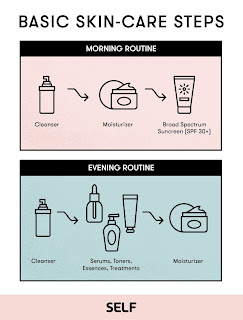How Lifestyle Habits Affects Our Skin
- Get link
- X
- Other Apps
Welcome back to my blog! Today I’m going to focus on skincare beyond cosmetic products, which is lifestyle. Lifestyle goes hand in hand with skincare products where both contribute to maximising the condition of your skin. I will be talking about some common habits that may be the reason why your skin breaks out or prevents it from being in its best condition.
Food
This is an obvious one. Just like working out and having a healthy diet will contribute to an overall healthier body, this is the same case with the skin. For example, if you only eat junk food, too much sugar/fat/salt, whatever, and not having at least a balanced diet with fruit and veg, then it’ll be hard to get clear skin unless you’re blessed with good genetics 😔 same goes with liquids – drink lots and lots of water!! Try and refrain from alcohol because it makes you dehydrated, balance it out with more water haha, or drink in moderation. You should also be aware of dairy products especially if you experience hormonal acne. This is because milk has hormones that can affect sebum production levels but of course, it depends on each person (see more at Nichols, 2020).
Stress
Similar to food, how you feel
can affect your skin. Again, stress can cause a rise in hormones and thus, an
increase in oil production and breakouts. Also, it can cause inflammation like eczema
and rosacea flare-ups which disrupts the skin barrier (Nathan, 2021). Whatever the
cause, try and stay calm!
Sleep
You can immediately tell if
someone hasn’t gotten enough sleep e.g. dark circles, eye bags, dull and
dehydrated skin. It’s called beauty sleep for a reason. When we sleep, this is
the time where our skin works EVEN MORE to repair and regenerate cells aka
collagen production for plumper, younger skin. Hence, with less sleep, our skin
won’t look as good compared to someone with a full night’s rest. You should aim
for 7-9 hours as an adult. You should also make sure your face is clean when
you sleep too i.e. free from makeup and dirt, as it can distort this process –
you don’t want to wake up to clogged pores and spots. The night-time process
begins as early as 9pm or as late as 2am and continues until when we wake up -
night owls better go to bed earlier. When we wake up, the skin switches from the
repairing stage to the protective stage to get ready for the day
ahead and the cycle continues.
(Walk-in Dermatology, 2020)
Dirty, dirty
Throughout the day, we are touching so many things, including our faces, and they all have some sort of dirt and bacteria. These may be unconscious actions but they can be bad for your skin. Transferring this dirt to your face can break you out and picking your spots can leave acne marks and scars. Please, please refrain from touching them and your face in general! You, reading this are probably guilty of bringing your phone to the toilet, right? I’m guilty of having done this too ☹ yeah, that’s a bad idea by the way with all that bacteria in there. One thing you may not think about is your pillowcases. Essentially you are laying on oils, dirt, and sweat from your hair and then covering your face with it (Weatherford, 2017) 😓. I would suggest changing it regularly, I change mine on a weekly basis but the more often you can, the better.
Did you know? Silk
pillowcases are better than cotton because it absorbs less moisture and
provide less friction on your skin and hair.
That’s it for today! I hope
you’ve learned some things and you’ll be changing your lifestyle habits for the
better. My assignment requires me to write a minimum of 5 blogs and since this
is the 5th one, I may or may not see you next time…hopefully though
if you’re all enjoying it 😊
References:
Nathan, N.
(2021). Stress may be getting to your skin, but it’s not a one-way street.
[online] Harvard Health. Available at: https://www.health.harvard.edu/blog/stress-may-be-getting-to-your-skin-but-its-not-a-one-way-street-2021041422334.
Nichols, H.
(2020). Dairy and acne: How does diet affect the skin? [online] Medical
News Today. Available at: https://www.medicalnewstoday.com/articles/dairy-and-acne#causes.
Walk-in
Dermatology. (2020). How Does Lack of Sleep Affect the Skin? [online]
Available at: https://walkindermatology.com/blog/how-does-lack-of-sleep-affect-skin/.
Weatherford,
A. (2017). Here’s How Often You Should Change Your Pillowcase. [online]
The Cut. Available at: https://www.thecut.com/2017/07/how-often-you-should-change-your-pillowcase.html.
Comments


Well done. A lot of efforts to put these together ! Keep it up!
ReplyDeleteThank you! :)
Delete